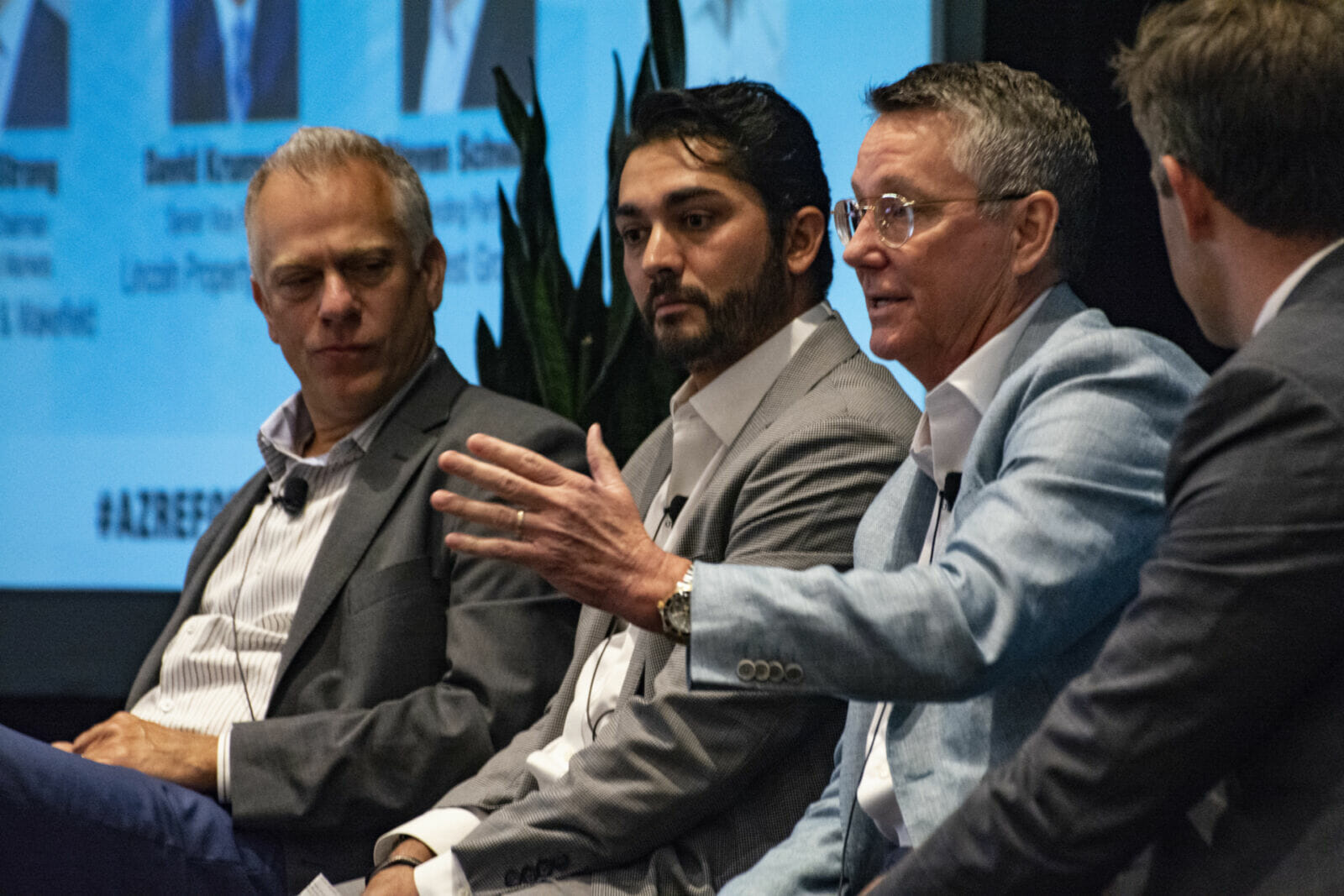On August 4, some of Arizona’s top commercial real estate (CRE) leaders gathered for the 8th annual AZRE Forum to give a mid-year update on the market. Here are some highlights from the four panels covering all aspects of CRE, from the booming industrial sector to retail.
READ ALSO: The Most Influential Women in Commercial Real Estate for 2022
“If you’re comparing Arizona rents to two years ago, you’re making the wrong comparison, because two years ago, we were at tier two industrial market. Now we’re at tier one,” says Bob Mulhern, senior managing director for Arizona at Colliers.
The industrial revolution panel
The industrial market in Greater Phoenix is as hot as a June afternoon, thanks in large part to a welcoming business environment in the Grand Canyon State. Rusty Martin, general manager, Southwest division, Graycor Construction Company, Inc., says that Arizona is a business friendly state, especially when compared to California, which isn’t as optimistic about growth.
That said, the issues plaguing all sectors of CRE are still at play at this point in 2022 — strained supply chains, labor constraints and rising costs. Andrew Geier, executive vice president of Layton Construction Company, explains that for his company to deliver product with the same speed, they have to start ordering materials as quickly as possible in the pre-construction process.
Looking to the next five years, James Murphy, CEO of Willmeng, predicts that automation will be utilized to greater extents, especially as the onshoring of manufacturing post-COVID continues to benefit Arizona.
Ben Gottlieb, founding partner at MacQueen & Gottlieb, who offered expert legal commentary throughout the forum, says to watch how the CHIPS Act could provide a further boost to Arizona’s already vibrant semiconductor industry.

Broker panel — multifamily, retail and land
Between the pandemic and the ascendency of Amazon, a pall has hung over the retail CRE segment. But most people misunderstand the relationship between online and in-person retail, according to Dave Cheatham, co-founder and president of Velocity Retail Group.
“It’s not bricks versus clicks,” he says.
Cheatham goes on to explain that many large retailers have not built a big box store in Phoenix for close to 15 years as those companies devoted resources to online shopping. Now, he says, there is pent up demand that must be met.
“In 2007, we were at 6% vacancy rate, and we’re now back at 6%, with the high tide at almost 14% vacancy,” Cheatham notes.
Ari Spiro, founding principal, Orion Investment Real Estate, adds, “It’s been 15 years since the big downturn, and if [retailers] hadn’t figured out e-commerce and omnichannel distribution, the pandemic made sure you were no longer in business after that.”
Broker panel — office and industrial
Many employees have enjoyed a hybrid or work from home schedule since the start of the pandemic, and some are reluctant to give up the flexibility that entails. Brian Uretzky, capital markets practice group leader at Keyser, predicts that the hybrid work environment is here to stay.
“I thought last fall was going to be with the trigger point, but then we got hit with delta, then omicron,” he says. “Now people have a new way of working that’s been ingrained.”
A recession could give employers more leverage to get employees back in the office, but Jessica Morin, head of U.S. office research for CBRE, notes workers will want a good reason. Some companies are upgrading their office space to encourage in-person collaboration. The flight to quality is borne out in the numbers: in the first half of the year, Phoenix had 1.9 million square feet of negative absorption in class B space compared to over 620,00 square feet of positive absorption for class A.
The money flow in CRE panel
With turbulence from inflation, geopolitical threats and rising interest rates, it’s no surprise that those in the market are recalibrating.
“Cap rates are a function of interest rates, but also a function of rental rate growth, supply of capital and risk aversion,” explains Will Strong, vice chairman of capital markets at Cushman & Wakefield. “To have [the war in] Ukraine, rising interest rates, COVID and issues with China, we’ve been hit in the gut a couple of times. We need some clarity in the market to continue forward.”
There are folks who are starting to consider more deals, says Larry Pobuda, executive vice president and general manager of Opus Development Company, but it has to be just right. “One of our capital partners recently described their philosophy as still being up to bat at the plate, but their strike zone has simply gotten smaller by four inches on every side. It has to be right down the center for them to swing.”




























































